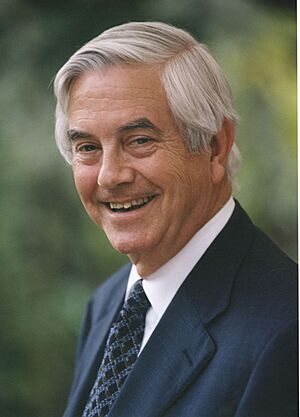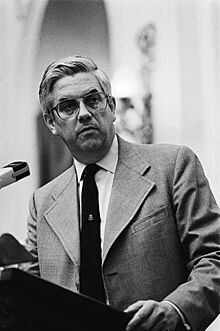Frits Bolkestein facts for kids
Quick facts for kids
Frits Bolkestein
|
|
|---|---|

Bolkestein in 1999
|
|
| European Commissioner | |
| In office 16 September 1999 – 22 November 2004 |
|
| President | Romano Prodi |
| Preceded by | Mario Monti as European Commissioner for Internal Market |
| Succeeded by | Charlie McCreevy as European Commissioner for Internal Market |
| President of the Liberal International | |
| In office 15 April 1996 – 18 April 2000 |
|
| Preceded by | Sir David Steel |
| Succeeded by | Annemie Neyts-Uyttebroeck |
| Leader of the People's Party for Freedom and Democracy |
|
| In office 30 April 1990 – 30 July 1998 |
|
| Deputy |
See list
Loek Hermans (1990)
Hans Dijkstal (1990–1998) Benk Korthals (1994–1998) Annemarie Jorritsma (1998) Gerrit Zalm (1998) |
| Preceded by | Joris Voorhoeve |
| Succeeded by | Hans Dijkstal |
| Leader of the People's Party for Freedom and Democracy in the House of Representatives | |
| In office 30 April 1990 – 30 July 1998 |
|
| Preceded by | Joris Voorhoeve |
| Succeeded by | Hans Dijkstal |
| Minister of Defence | |
| In office 24 September 1988 – 7 November 1989 |
|
| Prime Minister | Ruud Lubbers |
| Preceded by | Piet Bukman (ad interim) |
| Succeeded by | Relus ter Beek |
| State Secretary for Economic Affairs | |
| In office 5 November 1982 – 14 July 1986 Serving with Piet van Zeil
|
|
| Prime Minister | Ruud Lubbers |
| Preceded by | Wim Dik |
| Succeeded by | Enneüs Heerma |
| Member of the House of Representatives | |
| In office 14 September 1989 – 21 September 1999 |
|
| In office 3 June 1986 – 24 September 1988 |
|
| In office 16 January 1978 – 5 November 1982 |
|
| Parliamentary group | People's Party for Freedom and Democracy |
| Personal details | |
| Born |
Frederik Bolkestein
4 April 1933 Amsterdam, Netherlands |
| Died | 17 February 2025 (aged 91) Laren, Netherlands |
| Political party | People's Party for Freedom and Democracy (since 1975) |
| Relatives | Gerrit Bolkestein (grandfather) |
| Alma mater | University of Amsterdam (BSc, MA) London School of Economics (MSc) Leiden University (LLM) |
| Occupation |
|
Frederik "Frits" Bolkestein (born 4 April 1933 – died 17 February 2025) was a well-known Dutch politician. He also worked as an executive in the energy industry. He was the leader of a political party called the People's Party for Freedom and Democracy (VVD) from 1990 to 1998. Later, he became a European Commissioner for the Internal Market from 1999 to 2004.
Before his political career, Bolkestein worked for a large oil company, Royal Dutch Shell, from 1960 to 1976. He also managed an engineering company in Amsterdam. He first became a member of the House of Representatives (the Dutch parliament) in 1978. There, he focused on economic affairs.
In 1982, he became the State Secretary for Economic Affairs. This role is like a junior minister. He later served as Minister of Defence from 1988 to 1989. In 1990, he was chosen to lead his political party, the VVD. He was a very important figure in Dutch politics during the 1990s.
For the elections in 1994 and 1998, Bolkestein was the top candidate for his party. He also served as the President of the Liberal International, which is a worldwide group of liberal political parties. After leaving Dutch politics, he became a European Commissioner. This role involves working for the European Union to help manage different areas across Europe. He was in charge of the internal market, which means making it easier for businesses to operate across EU countries.
Contents
Frits Bolkestein's Early Life and Education
Frits Bolkestein was born in Amsterdam, Netherlands, on 4 April 1933. His father was a judge. His grandfather, Gerrit Bolkestein, was a Minister of Education for the Dutch government during World War II. His mother was born in the Dutch East Indies.
Frits went to school in Amsterdam from 1945 to 1951. He studied both arts and sciences. After high school, he studied mathematics at Oregon State College in the United States. He then went to the University of Amsterdam, where he earned degrees in mathematics, physics, philosophy, and Greek. He also studied at the London School of Economics and Leiden University, where he earned a law degree.
While studying in Amsterdam, Bolkestein was involved with student life. He worked for a student magazine and was on the board of the student union.
Working Before Politics
Before he became a politician, Bolkestein worked for Royal Dutch Shell, a big oil company. He worked for Shell from 1960 to 1975. During this time, he lived and worked in many different countries, including East Africa, Honduras, El Salvador, Indonesia, the United Kingdom, and France. In France, he was on the board of Shell Chimie.
While working for Shell, he continued his studies. He completed part of an economics program and earned his law degree. In 1976, he wrote a play in English called Floris, Count of Holland. He used a pen name for this play.
His Political Career and Later Life
Frits Bolkestein left Shell in 1976 to become a member of parliament for the VVD party. From 1982 to 1986, he was the Minister of International Trade. This role involved managing trade relationships with other countries. After returning to parliament, he served as Minister of Defence from 1988 to 1989.
In 1990, he became the leader of the VVD party. He held this important position until 1998. He was a member of parliament for 17 years in total, from 1978 until 1999.
During the 1990s, Bolkestein was very successful as a political leader. He was known for sharing strong and sometimes controversial opinions. He spoke openly about topics like multiculturalism in the Netherlands and the future of the European Union. Even when his party was part of the government after 1994, he continued to speak his mind. His strong opinions helped his party become very popular in the 1995 provincial elections.
From 1996 to 2000, he was the president of the Liberal International. This organization connects liberal political parties around the world. After leaving his role as European Commissioner in 2004, he became a professor at universities in the Netherlands.
Frits Bolkestein wrote many books about politics and related subjects. He was married to Femke Boersma, a retired actress. He passed away in Laren on 17 February 2025, at the age of 91.
The Bolkestein Directive
A well-known piece of European Union law is named after Frits Bolkestein: the Directive on services in the internal market. This law aimed to make it easier for companies in one EU country to offer services in other EU countries. The original idea was that companies could follow the laws of their home country.
This idea caused many protests across Europe. People were worried it might lower social standards and create unfair competition. In 2006, the European Parliament voted on the directive. They changed the "principle of origin" (where companies followed their home country's laws). Instead, they introduced a "freedom to provide services" principle. This meant removing administrative barriers for companies.
This compromise allowed the directive to move forward. However, there were still concerns about its impact on workers' rights and welfare. Despite the protests, the Parliament officially adopted the directive in December 2006. This was two years after Bolkestein had left his position as European Commissioner.
Awards and Recognition
Frits Bolkestein received several important awards and honors for his work:
- He was made a Knight of the Order of the Netherlands Lion in 1986.
- He became a Commander of the Order of Orange-Nassau in 1989.
- In 1991, he received the Grand Cross of the Order of Merit from Portugal.
- He was given an honorary law degree from the University of Bradford in 2003.
- In 2004, he was made a Commander of the Order of the Netherlands Lion.
- He also received the Grand Cross of the Order of Merit of the Federal Republic of Germany from Germany.
- In 2010, he was awarded the Prize for Liberty by a Belgian think tank called Libera!.
Books Written by Frits Bolkestein
Frits Bolkestein was an author and wrote several books on politics and other topics:
- (1976) Floris, Count of Holland (under a pen name)
- (1982) Modern Liberalism
- (1990) De Engel en het Beest (The Angel and the Beast)
- (1992) Woorden hebben hun betekenis (Words Have Their Meaning)
- (1994) Islam en Democratie (Islam and Democracy) with Mohammed Arkoun
- (1995) Het Heft in Handen (Taking Control)
- (1997) Moslim in de Polder (Muslim in the Polder)
- (1998) Boren in hard Hout (Drilling in Hard Wood)
- (1998) Onverwerkt Verleden (Unprocessed Past)
- (2004) De Grenzen van Europa (The Borders of Europe)
- (2005) Grensverkenningen (Border Explorations)
- (2006) De twee lampen van de staatsman (The Two Lamps of the Statesman)
- (2006) Peut-on réformer la France? (Can France Be Reformed?)
- (2008) Overmoed en onverstand (Overconfidence and Folly)
- (2009) De politiek der dingen (The Politics of Things)
- (2011) De goede vreemdeling (The Good Stranger)
- (2011) De intellectuele verleiding (The Intellectual Temptation)
- (2013) Cassandra tegen wil en dank (Cassandra Against Her Will)
- (2015) De succesvolle mislukking van Europa (The Successful Failure of Europe), co-edited with Paul Cliteur and Meindert Fennema
See also
 In Spanish: Frits Bolkestein para niños
In Spanish: Frits Bolkestein para niños
 | Isaac Myers |
 | D. Hamilton Jackson |
 | A. Philip Randolph |


